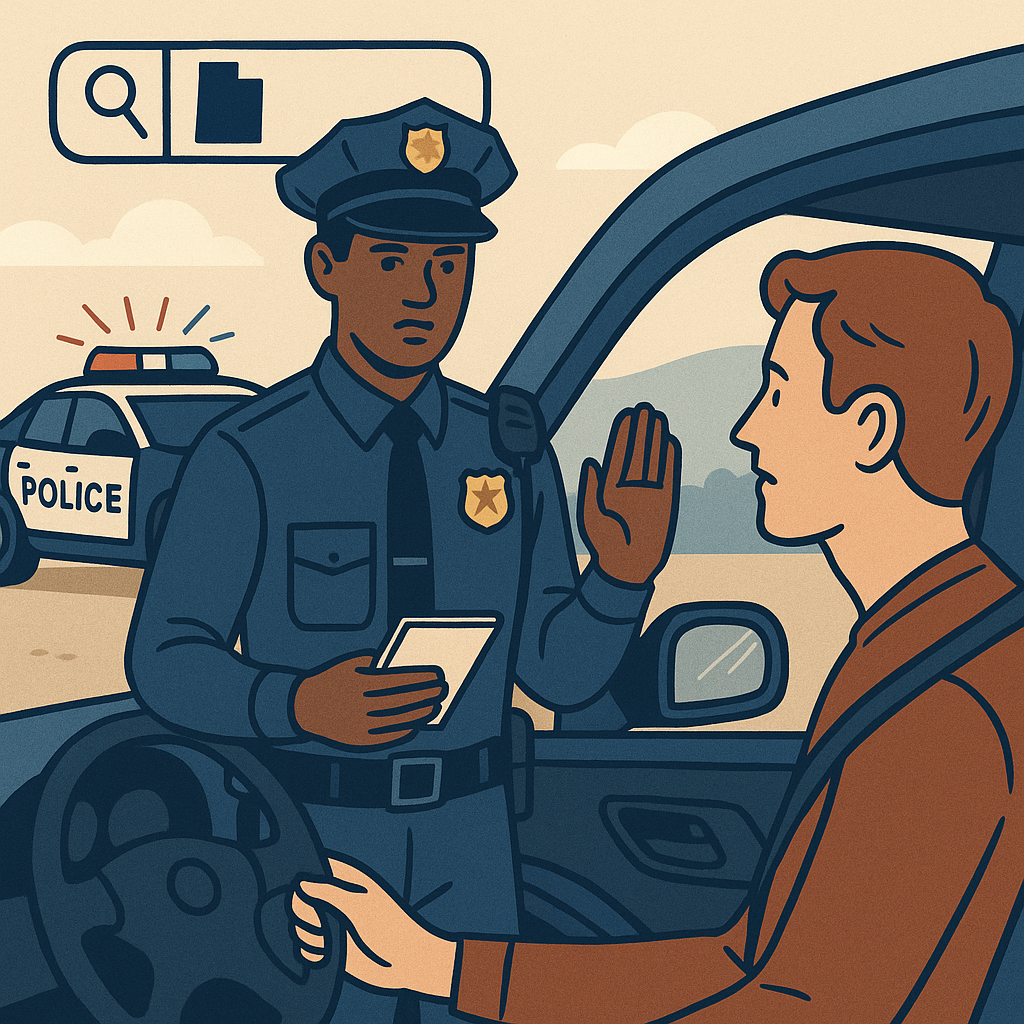Your Rights at a Police Stop in Utah
What officers can ask, when you must ID yourself, and how to refuse a search or questioning
This article explains your rights and responsibilities when stopped by police in Utah, including what officers can ask, when you must identify yourself, and when you can refuse a search or questioning.
Traffic stops, pedestrian encounters, and home visits by police can be stressful. Knowing your rights helps you stay calm and protected. This guide breaks down Utah’s laws on police encounters, showing when you must comply, when you can say no, and how to assert your rights respectfully and legally.
When Police Can Legally Stop You in Utah
In Utah, police can stop you if they have reasonable suspicion that you have broken a law or are about to commit one. This standard is lower than probable cause but must be based on clear, specific facts.
- Traffic stops: Officers must have a valid reason, such as speeding, equipment violations, or erratic driving.
- Pedestrian stops: Police must be able to explain why they believe you are involved in criminal activity.
- Checkpoints: Utah allows sobriety checkpoints only under strict procedures approved by courts.
If you are unsure why you were stopped, you may politely ask, “Officer, am I being detained or am I free to go?”
When You Must Show ID
Under Utah Code § 77-7-15, you are required to identify yourself only when:
- You are lawfully detained.
- You are driving a vehicle and must show your driver’s license, registration, and proof of insurance.
If you are a passenger, you generally do not have to provide ID unless the officer has a legal reason to request it, such as during an active investigation.
Your Right to Remain Silent
You have the right to remain silent under both Utah law and the U.S. Constitution. You can politely say: “I am exercising my right to remain silent.”
You do not have to answer questions about where you are going, what you are doing, or your immigration status. Stay calm, keep your hands visible, and do not argue.
Searches: When Officers Can and Cannot Search
Police cannot search your car, home, or belongings without your consent, a valid warrant, or a clear exception such as:
- Probable cause, such as visible contraband
- Search incident to arrest
- Safety concerns, for example if an officer believes you have a weapon
- Impounded vehicle inventory searches
If asked for permission, you can clearly state: “I do not consent to any searches.” This does not stop an officer if they already have legal grounds, but it preserves your rights if the search is later challenged.
Traffic Stop vs. Stop on Foot
During a traffic stop:
- Pull over safely and remain inside your car unless told otherwise.
- Keep your hands visible and avoid sudden movements.
- Provide your license, registration, and proof of insurance.
- Stay polite and do not argue or resist.
During a stop on foot:
- You can ask, “Am I free to leave?”
- If the answer is yes, calmly walk away.
- You do not have to answer questions or consent to a search.
Probable Cause and Warrants
Probable cause means the officer has reasonable, factual grounds to believe a crime occurred. Without it, police generally need a warrant signed by a judge to search your property or make an arrest.
Warrants must specify the place to be searched and the items sought. Utah courts enforce this strictly, especially in home and digital privacy cases.
Recording Police Encounters in Utah
You have the legal right to record police in public as long as you do not interfere with their duties. Keep the camera visible and do not physically obstruct officers. Utah law (Utah Code § 76-9-402) protects recording for accountability purposes.
Tip: Save copies of recordings off your device in case it is confiscated or damaged.
If You Believe Your Rights Were Violated
- Do not resist or argue on scene. Stay calm and record what you can.
- Write down details: officer names, badge numbers, vehicle numbers, and time of incident.
- File a complaint with the agency’s internal affairs division.
- Consult a Utah criminal defense attorney about possible civil rights claims.
Utah’s legal process allows you to challenge unlawful stops, searches, and arrests through suppression motions and other remedies.
Related Utah Code
- Utah Code § 77-7-15 — Duty to disclose identity to law enforcement officers
- Utah Code § 77-23-201 — Search and seizure procedures
- Utah Code § 76-9-402 — Interference with police and lawful recording rights
Video & Social Learning Hub
YouTube: Learn More About Utah Police Stops
Need Help Applying This to Your Situation?
Understanding your rights during a Utah police stop can make the difference between a calm, lawful encounter and an unnecessary conflict. Stay respectful, assert your rights clearly, and never resist physically. If you believe your rights were violated, contact a Utah criminal defense attorney for legal guidance.
Talk to a Utah AttorneyUtah Law Explained is committed to helping you understand Utah law in plain English. This page is legal information, not legal advice. Always know your rights and use them responsibly.
